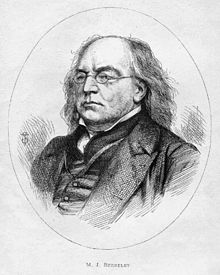Miles Joseph Berkeley
| Miles Joseph Berkeley | |
|---|---|
 |
|
| Born | 1 April 1803 |
| Died | 30 July 1889 (aged 86) |
| Nationality | British |
| Occupation | vicar |
| Known for | Outlines of British Fungology |
| Awards | Royal Medal (1863) |
Miles Joseph Berkeley (1 April 1803 – 30 July 1889) was an English cryptogamist and clergyman, and one of the founders of the science of plant pathology.
Berkeley was born at Biggin Hall, Benefield, Northamptonshire, and educated at Rugby School and Christ's College, Cambridge. Taking holy orders, he became incumbent of Apethorpe in 1837, and vicar of Sibbertoft, near Market Harborough, in 1868. He acquired an enthusiastic love of cryptogamic botany (lichens) in his early years, and soon was recognized as the leading British authority on fungi and plant pathology. Christ's College made him an honorary fellow in 1883.
He was well known as a systematist in mycology with some 6000 species of fungi being credited to him, but his Introduction to Cryptogamic Botany, published in 1857, and his papers on Vegetable Pathology in the Gardener's Chronicle in 1854 and onwards, show that he had a broad grasp of the whole domain of physiology and morphology as understood in those days. Berkeley began his work as a field naturalist and collector, his earliest objects of study having been the mollusca and other branches of zoology, as testified by his papers in the Zoological Journal and the Magazine of Natural History, between 1828 and 1836.
As a microscopist he was an assiduous and accurate worker, as shown by his numerous drawings of the smaller algae and fungi, and his admirable dissections of mosses and Hepaticae. His investigations on the potato murrain, caused by Phytophthora infestans, on the grape mildew, to which he gave the name Oidium Tuckeri, and on the pathogenic fungi of wheat rust, hop mildew, and various diseases of cabbage, pears, coffee, onions, tomatoes, and other plants, were important in results bearing on the life-history of these pests, at a time when very little was known of such matters, and must always be considered in any historical account of the remarkable advances in the biology of these organisms made between 1850 and 1880. When it is remembered that this work was done without any of the modern appliances or training of a properly equipped laboratory, the real significance of Berkeley's pioneering work becomes apparent. It has been said that
...
Wikipedia
